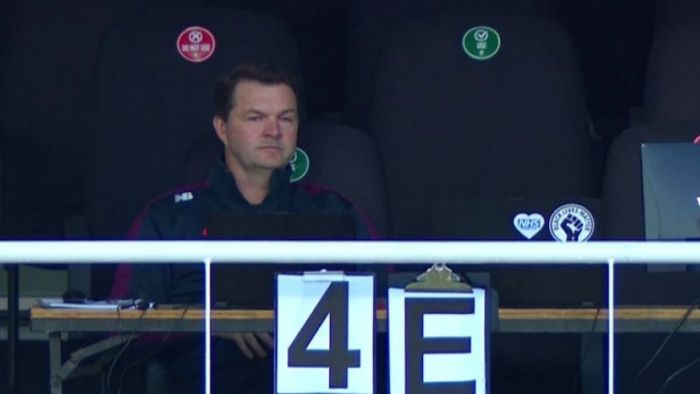Former England cricket captain Michael Vaughan has spoken out against a decision by the team to send coded information using signals during a T20 international against South Africa.
Key points:
- An England team analyst was seen hanging signs with letters and numerals from the balcony
- Former England captain Michael Vaughan says there is a potential for such signals to be seen and used by those outside the team for corruption
- However current skipper Eoin Morgan has declared the team will “definitely continue” with the practice to see if it improves their decision-making on-field
But England skipper Eoin Morgan defended the move, saying he was happy it was within the spirit of the game.
The practice came under the spotlight in England’s final T20 international against South Africa earlier this week.
Team analyst Nathan Leamon was shown by TV cameras hanging signs with letters and numerals on the balcony so they could be seen from the field while Morgan’s team was fielding.
England swept the T20 international series with South Africa 3-0.
The third game in Cape Town saw England chase down a target of 192 with 14 balls to spare, thanks to an unbeaten 99 from Dawid Malan, after South Africa made 3-191 off their 20 overs.
Speaking on BBC radio, Vaughan said he didn’t feel the England side — that reached number one in the world T20 team rankings with the win in Cape Town — needed to “show the opposition anything”.
“Eoin Morgan is the greatest white-ball captain we [England] have had by some distance, Jos Buttler’s probably the greatest white-ball cricketer we’ve ever had behind the stumps,” Vaughan said.
“I just don’t understand why you’d want to give the opposition any sort of information from the balcony.
Vaughan said if there was a need to send information to the captain to remind him who the best bowling match-ups for batsmen were, it could be handled by a message run out by the 12th man.
He said he “liked things done privately,” rather than exposed to others through signals.




The strategy was reportedly cleared in advance by the match referee, but Vaughan said he felt that the practice could be a problem with cricket’s anti-corruption approach.
“We’ve been hounded with anti-corruption and match-fixing problems within cricket for many, many years,” he said.
“I’ve no idea how the ICC can clear an analyst giving information to the team from the sideline.
“I know it’s been mentioned that you can pass a piece of paper [to the players] and that’s fine, because it’s private.
“A 12th man can run on a bit of information and that’s private, but by deliberately putting signals on a balcony [that’s different].
“I think the ICC have to look at this and go now, ‘Wait a minute, why would we allow some kind of signalling to go on from the balcony that could potentially — I’m just saying potentially — could be picked up by someone in that ground that could be used in some kind of corruption?'”
England will ‘definitely continue’ with signals, says Morgan
Morgan rejected suggestions there was anything wrong with the tactic.
“There is nothing untoward about it. It is about maximising information that we are taking in and measuring it against things, coaches’ recommendations … the data about what is going on.
“We are definitely going to continue with it and give it enough sample size to see if it makes a difference to, or improves, our decision-making on the field or improves our performance, or it might tell us more about how we understand information that we are taking in during games.”
AP/ABC







